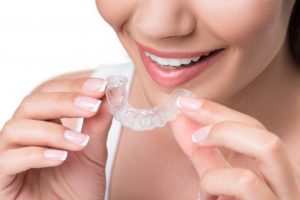
You’ve been thinking about how Invisalign could potentially work wonders to straighten your smile, but something is causing you to hesitate. You’re prone to teeth grinding, especially at night. You wonder how clear aligners would fit into that equation because you don’t want anything to interfere with the Invisalign treatment, but you’ve been wearing a night guard to protect your teeth. Read on to hear from your orthodontist in Parsippany on the matter.
Why Is Bruxism a Concern?
Teeth grinding, aka bruxism, is most common in children, adolescents, and young adults. Studies show it affects up to 50 percent of children, 15 percent of adolescents, and eight percent of middle-aged adults. Exact statistics are difficult to come by since many people aren’t aware of their teeth grinding.
People who grind their teeth at night can exert up to 250 pounds of force, so it’s no wonder even strong tooth enamel can be damaged over a long period. Bruxism while awake is more common, but the potential for damage is not nearly as great since it’s much harder for people who are asleep to be aware they are grinding their teeth.
People with sleep bruxism may have up to 100 episodes of clenching per night – lasting up to one second each – or the grinding may not occur every night. Sleep bruxism usually doesn’t occur during REM sleep. It generally happens earlier in the sleep cycle.
Jaw and neck pain are two frequent signs of teeth grinding. Also, be aware of a headache in the morning that may feel like a tension headache. Plus, if you have sustained damage to your teeth but can’t figure out why it could be an indication of nighttime grinding and clenching.
Can I Get Invisalign If I’m Dealing with Bruxism?
The answer is even better than a simple “yes.” Not only can you undergo Invisalign treatment while dealing with teeth grinding, but the clear aligners can potentially help you end your struggles with bruxism. One of the primary causes of teeth grinding for some people is misaligned teeth.
Teeth that don’t fit together properly can irritate your temporomandibular joints, which connect your jawbone to your skull. This irritation sometimes triggers an involuntary reaction that can result in grinding. During Invisalign treatment, you’ll wear the aligners overnight when the most-damaging grinding can occur.
Invisalign will serve as a barrier against the grinding, but you will typically wear through the plastic quicker than a person who doesn’t grind. This is okay; it’s just something your orthodontist will need to be aware of throughout treatment. It’s crucial for the aligners to provide some protection against bruxism because you will not be able to wear a night guard or other protective devices while you sleep.
Not only can the results of Invisalign potentially lead to the end of your bruxism one day, but the clear aligners can even protect your teeth during treatment. Now that you’ve received the good news, you can move forward and meet with your orthodontist!
About the Author
Dr. Denise Kitay counts on her 25 years of orthodontic experience to help her patients in Parsippany. She attained her dental doctorate from Stony Brook, later completing a three-year orthodontic residency at Harvard and obtaining a Master of Medical Sciences degree. She is a member of the American Association of Orthodontists. If you are interested in Invisalign, dental insurance is accepted, flexible financing is available, and discounts can be accessed through our in-office membership plan. You can schedule a consultation with Dr. Kitay on our website or call (973) 718-9887.
